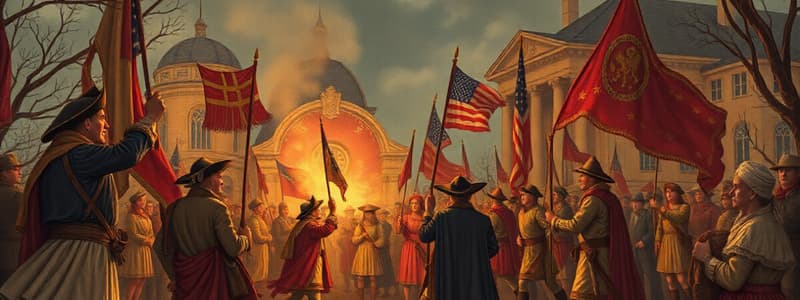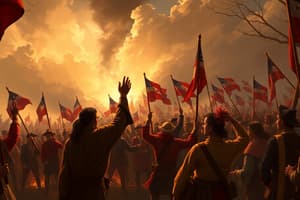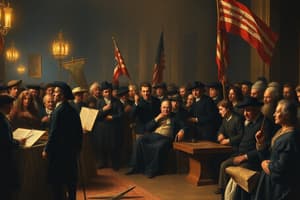Podcast
Questions and Answers
Which event marked the beginning of tensions that led to the American Revolution?
Which event marked the beginning of tensions that led to the American Revolution?
- Stamp Act (correct)
- Boston Tea Party
- Declaration of Independence
- Boston Massacre
The Declaration of Independence was drafted and approved without any changes made by the Continental Congress.
The Declaration of Independence was drafted and approved without any changes made by the Continental Congress.
False (B)
What were the committees of correspondence established for?
What were the committees of correspondence established for?
To organize boycotts of British goods and spread information about resistance.
The American Revolution marked a transition from a monarchy to a government without a _____
The American Revolution marked a transition from a monarchy to a government without a _____
Match the following events with their significance:
Match the following events with their significance:
Which of the following was a significant result of the revolution?
Which of the following was a significant result of the revolution?
What was the main reason behind British taxation of the American colonists after the 7 Years War?
What was the main reason behind British taxation of the American colonists after the 7 Years War?
What core ideals did the American Revolution emphasize?
What core ideals did the American Revolution emphasize?
The Enlightenment primarily encouraged blind faith and traditional beliefs.
The Enlightenment primarily encouraged blind faith and traditional beliefs.
The Enlightenment ideas primarily focused on collective rights over individual rights.
The Enlightenment ideas primarily focused on collective rights over individual rights.
Name one Enlightenment thinker who argued that human reason made belief in God unnecessary.
Name one Enlightenment thinker who argued that human reason made belief in God unnecessary.
The American Revolution served as a model for political discourse and challenged deeply rooted social ________.
The American Revolution served as a model for political discourse and challenged deeply rooted social ________.
Match the following thinkers to their core beliefs:
Match the following thinkers to their core beliefs:
What primary change did the French Revolution aim for compared to the American Revolution?
What primary change did the French Revolution aim for compared to the American Revolution?
The influence of the revolution regarding property and equality has ceased after the 18th century.
The influence of the revolution regarding property and equality has ceased after the 18th century.
Flashcards are hidden until you start studying
Study Notes
The American Revolution
-
The American Revolution, a significant period in history, involved a series of events starting with the end of the 7 Years War (1763) and culminating in the declaration of Independence in 1776.
-
The 7 Years War was costly for the British, and the victory led to increased land and wealth for British subjects including those residing in America.
-
The British government asserted its right to tax the American colonists, citing the need for funds to cover the war's expenses, leading to the implementation of the Stamp Act in 1765.
-
The colonists protested against the Stamp Act, arguing that they had no representation in the British Parliament that imposed the tax. The British government repealed the act in response to the protests.
-
Subsequent British attempts to tax the colonists, including the Townshend Acts, sparked further protests, boycotts, and escalated tensions between colonists and the British.
-
The Boston Massacre (1770), resulting in the death of five individuals, and the Boston Tea Party (1773) were crucial events that galvanized colonial resistance against British rule.
-
The Boston Tea Party, a protest against British trade policies, involved colonist dumping tea into Boston Harbor.
-
Colonial committees of correspondence were established to organize boycotts of British goods and spread information about the ongoing resistance against British policies.
-
The committees also played a role in coordinating colonial efforts, which ultimately led to the formation of the Continental Congress in 1775.
-
The Declaration of Independence, a defining document of the American Revolution, was drafted and approved by the Continental Congress.
-
Notably, the Continental Congress edited out a significant portion of Thomas Jefferson's original draft of the Declaration of Independence.
-
Many colonists adopted a sense of distinct identity separate from Great Britain, as demonstrated by their pre-war actions.
-
The American Revolution marked a transition from a monarchy to a government without a king, a revolutionary shift in a world largely dominated by monarchies.
-
The revolution's core ideals, such as property rights and equality, shaped the American government's structure and policies.
-
The revolution was shaped by Enlightenment ideas, particularly regarding human reason and individual rights, and these ideas contributed to the colonists' pursuit of independence.
-
The revolution resulted in the creation of a society that eliminated formal nobility and established equal inheritance and property rights for certain individuals (e.g. daughters, widows).
-
Though the revolution brought significant changes, it did not fully address existing inequalities.
-
The American Revolution served as a model for political discourse and challenged deeply rooted social structures.
-
The influence of the revolution, especially regarding property, equality, and representation, continues to be felt globally.
The Enlightenment
-
The Enlightenment was a period characterized by a strong emphasis on human reason and the idea that through reason, humanity could understand and improve the natural world around them.
-
Influenced by the Renaissance and Scientific Revolution, the Enlightenment challenged traditional thinking and emphasized the power of human reason to guide progress.
-
Some Enlightenment thinkers, such as Immanuel Kant, went so far as to argue that human reason made belief in God unnecessary, setting off controversy.
-
Moderate Enlightenment thinkers endorsed a more hierarchal social and political order, advocating for individual rights within a structured system. For example, John Locke's concept of individual rights included life, liberty, and property.
-
The French Revolution, drawing inspiration from more radical Enlightenment thinkers, aimed for a more significant dismantling of social and political structures.
-
Despite its limitations and imperfections, the American Revolution represented a landmark step towards establishing a new society based on principles of liberty and self-governance.
The American Revolution
- The American Revolution began following the end of the Seven Years' War (1763) and culminated in the declaration of Independence in 1776.
- The Seven Years' War (1756-1763), also known as the French and Indian War, was a costly conflict for the British.
- The British victory in the Seven Years' War led to increased land and wealth for British subjects, including those residing in the American colonies.
- In order to cover war costs, the British government began to assert its right to tax the American colonists prompting the implementation of the Stamp Act in 1765.
- The colonists protested against the Stamp Act, arguing that they had no representation in the British Parliament that imposed the tax.
- The British government repealed the Stamp Act in response to protests.
- Subsequent British attempts to tax the colonists via the Townshend Acts sparked further protests, boycotts, and escalated tensions between colonists and the British.
- The Boston Massacre (1770), resulting in the death of five individuals, and the Boston Tea Party (1773) galvanized colonial resistance against British rule.
- The Boston Tea Party, a protest against British trade policies, involved colonists dumping tea into Boston Harbor.
- Colonial committees of correspondence were established to coordinate boycotts of British goods and spread information about the ongoing resistance against British policies.
- The committees also played a role in coordinating colonial efforts, which ultimately led to the formation of the Continental Congress in 1775.
- The Declaration of Independence, a defining document of the American Revolution, was drafted and approved by the Continental Congress.
- The Continental Congress significantly edited Thomas Jefferson's original draft of the Declaration of Independence.
- Prior to the war, many colonists adopted a sense of distinct identity separate from Great Britain.
- The American Revolution marked a transition from a monarchy to a government without a king, a revolutionary shift in a world largely dominated by monarchies.
- The revolution's core ideals, such as property rights and equality, shaped the American government's structure and policies.
- The revolution was shaped by Enlightenment ideas, particularly regarding human reason and individual rights.
- The revolution resulted in the creation of a society that eliminated formal nobility and established equal inheritance and property rights for certain individuals (e.g. daughters, widows).
- Though the revolution brought significant changes, it did not fully address preexisting inequalities.
- The American Revolution served as a model for political discourse and challenged deeply rooted social structures.
- The influence of the revolution, especially regarding property, equality, and representation, continues to be felt globally.
The Enlightenment
- The Enlightenment was a period characterized by a strong emphasis on human reason and the idea that through reason, humanity could understand and improve the natural world around them.
- The Enlightenment challenged traditional thinking and emphasized the power of human reason to guide progress, influenced by the Renaissance and Scientific Revolution.
- Some Enlightenment thinkers, such as Immanuel Kant, argued that human reason made belief in God unnecessary, setting off controversy.
- Moderate Enlightenment thinkers endorsed a more hierarchal social and political order, advocating for individual rights within a structured system.
- John Locke's concept of individual rights included life, liberty, and property.
- The French Revolution, drawing inspiration from more radical Enlightenment thinkers, aimed for a more significant dismantling of social and political structures.
- Despite its limitations and imperfections, the American Revolution represented a landmark step towards establishing a new society based on principles of liberty and self-governance.
Studying That Suits You
Use AI to generate personalized quizzes and flashcards to suit your learning preferences.




